THE STORY
L’école fula flute is an initiative that has its roots in Sylvain Leroux’ invention of the chromatic tambin that added three more finger holes to the traditional tambin’s existing three rendering it capable of playing any style of music. This gave him the idea that this new instrument could be used as a culturally appropriate tool to teach the fundamentals of music theory to children in Guinea.
In Conakry in early 2013, looking to test his ideas, he was recommended to the Centre Tyabala Theatre de Guinée, an alternative arts-in-education program that had been in operation since 2009 giving classes in theater and music along with a fundamental elementary curriculum. They welcomed Sylvain and for three weeks he began to apply his ideas. The kids immediately fell in love with the tambin, the sound of which has deep resonance among Guineans, and, despite the headaches that come with early flute playing, they eagerly pushed forward.
That result gave Sylvain motivation to raise the funds needed in a Kickstarter project and in 2014, he spent four months working with the students at the Centre. The kids made tremendous progress on the instrument and an appreciable one in music literacy. This culminated with the recording of an album/CD, “Les Enfants de Tyabala” on Mulatta Records, released later that year along with a one-hour film of the same title.
At the film premiere a generous audience member, Gary Zaremba, was moved to offer financial support for a traditional flute teacher to continue the kid’s instruction while Sylvain was away. Sylvain then recruited his old teacher Mamadi Mansaré, the retired veteran of the world-renowned Ballets Africains and one of the most well-known and well-respected flutists in Guinea. He began teaching in 2015 and found that the students were enthusiastic about learning which made him very happy and, after many years of witnessing the flute tradition dwindle, gave him hope for the future. Mamadi has continued to teach weekly ever since.
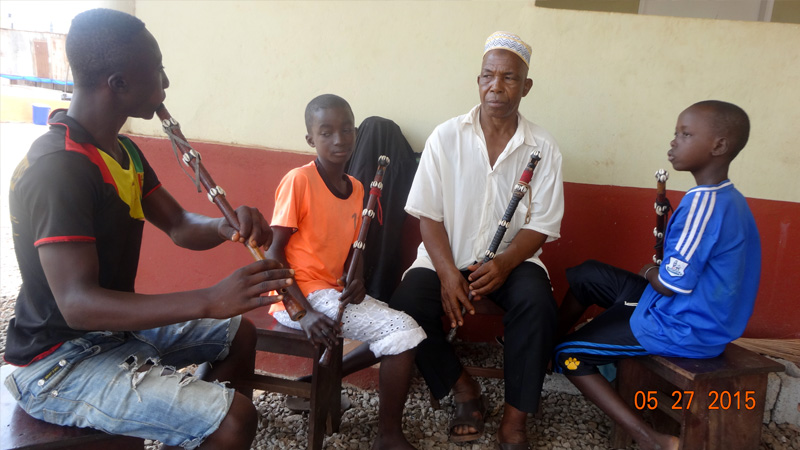
In 2016, another new teacher, Bouba Mbeng, joined the school. A great percussionist, composer-arranger, singer and ngoni player with deep knowledge of traditional music and possessing a gentle and generous soul, he assiduously developed a bond of trust with his students teaching them songs and arrangements which over time developed into a deep repertoire.
Meanwhile, the Centre Tyabala had been operating in a giant industrial hangar that had been repurposed as a State community facility which they shared with other youth groups, dance companies, martial-arts classes, printing shop, storage, parking lot, etc. However, in the summer of 2016 the State in its wisdom decided to transform it into a sewing training facility and with a week’s notice, everyone was evicted. Our school found itself working outdoors and several classes fell by the wayside although the flute and percussion classes continued despite the monsoon rains.
Back in the US and alarmed by the situation, Sylvain conducted a campaign that raised the necessary funds for the program activities to move to a 4-room house in an enclosed courtyard at the end of a quiet street nearby.
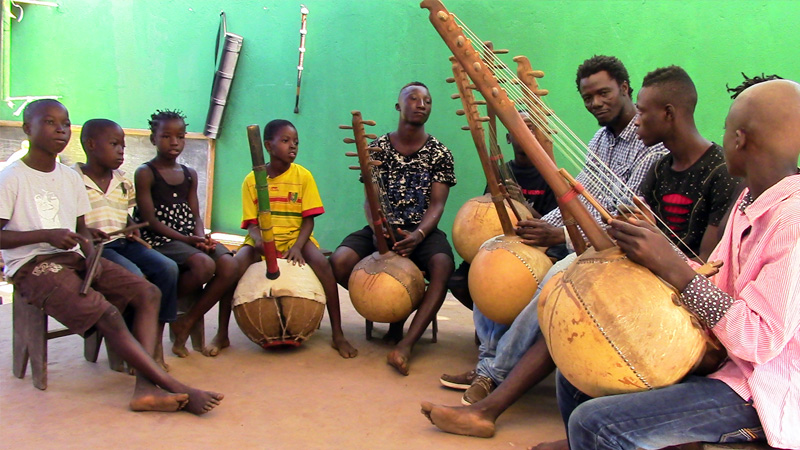
Now feeling secure and in control, an emphasis was put on elementary education: reading, writing, arithmetic, social sciences, civics, etc. The health of students is of a primary concern, they are fed daily and classes take place from 8:20 am until 5:30 pm with breaks. Young students were recruited and the faculty grew with the addition of new teachers: Tanly Seydou for music theory; Djamady Kouyate for kora, and Baba Galle Barry for Fula flute.
The students are often called upon to give concerts and present plays and the addition of the tambin to their capabilities has given them a special cachet much appreciated by the community.
In 2019, we received many interesting visitors. Some, great artists appearing at the International Jazz Festival (FIZZ) like Haitian diva Emeline Michel with saxophonist Jowee Omicil, Malian luminary Cheick Tidiane Seck, and Martinican percussionist Boris Reine-Adelaide and others such as American Fula flute player Thomas Vahle who spent a few days teaching our students. All of them left enchanted about what they witnessed and experienced with us. Likewise, American filmmaker Rich McKeown came, filmed classes and conducted interviews and with these materials plus historical footage and photos we provided, assembled a short film titled “L’ECOLE FULA FLUTE” that was thereafter selected by many film festivals, including Montreal’s “Festival Vues d’Afrique”.
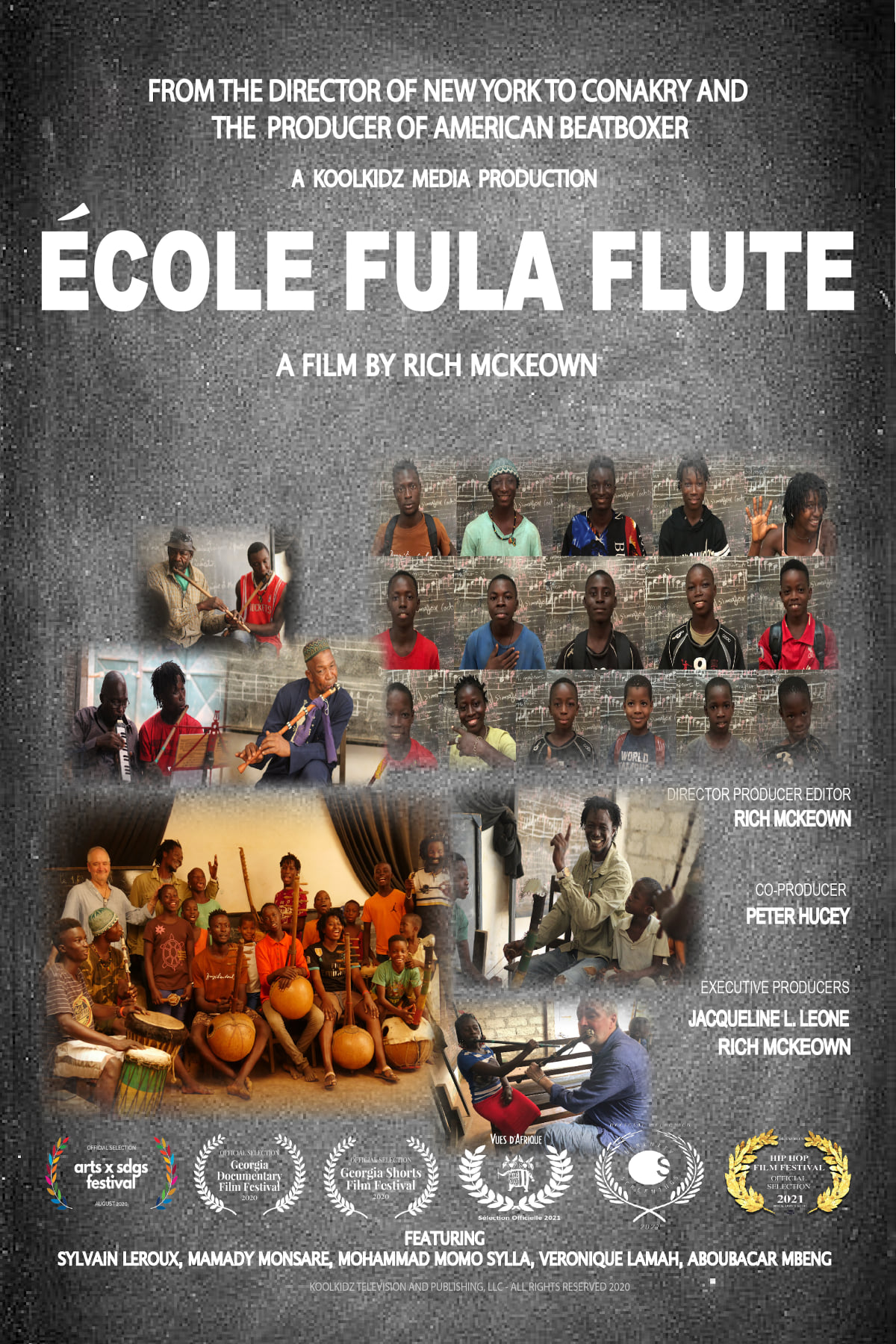
In 2019 a new recording of our students called “TYABALA” was released (Mulatta Records 042) featuring the wonderful work taking place at l’école fula flute and it was very well received.
2020 and 2021 were particularly challenging, there was the COVID crisis, of course, that put a great strain on people’s livelihoods, especially on musicians because of the ban on live performances and gatherings. But in March 2020, we attempted to improve our housing situation which had become untenable and moved our activities further from the city in a beautiful large brand new house, clean with beautiful tiled floors, a closed courtyard and a large porch. However, when the rainy season arrived, we were dangerously flooded and a lot of equipment, costumes, clothes, instruments, books and supplies were damaged, not to mention the fright experienced by those who were sleeping and had to evacuate rapidly rising waters in the middle of the night.
Therefore, we had to move again even further in the suburbs. This time we found a well-built house, not entirely finished but spacious and secure with a enclosed courtyard located in the Sonfonia district.
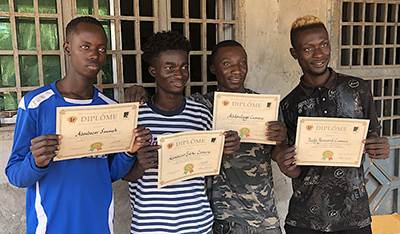
In 2021, we held our first “concours de sortie” (exit contest) final exams and four of our students, Naby Youssouf Camara, Abdoulaye Camara, Sidiki Camara and Aboubacar Soumah were awarded the diploma.
These young people had already begun to make their way into the labor market as performers with companies and groups and as teachers at local school and NGOs. Among them, Abdoulaye Camara was appointed flutist with the Ballets Africains—the prestigious national company which in the 1950s inspired Miles Davis and a generation of artists around the world—thus succeeding his teacher, Mamady Mansaré, in the position. It is an immense honor, a marvelous reward, and a validation of our work and your trust, dear generous donors.
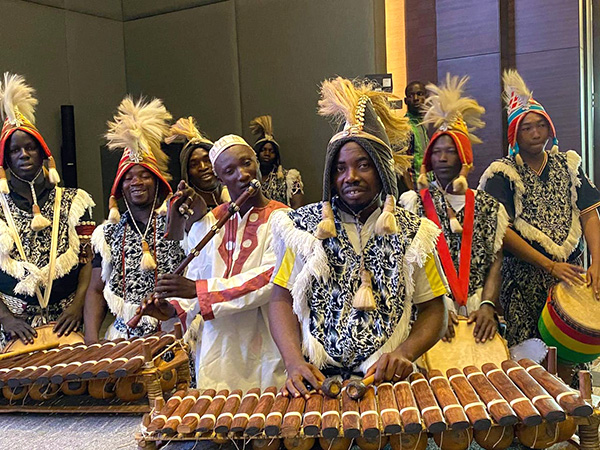
In November of 2023, the Centre Culturel Franco-Guinéen (CCFG), Guinea’s French Cultural Center, hosted three days of events celebrating the work of the Centre Tyabala / ecole fula flute through films, plays, and a major live performance. During this event, we premiered the documentary The 14 Years of Tyabala, a compelling film directed by Becky Lamming and compiled from a decade of archival footage. Ms. Lamming also produced a second film from the live show, titled On est là! (We Are Here!).

Both films have since been regularly broadcast on Guinea’s national television network, RTG. The network praised their high production quality and strong cultural relevance, leading to increased visibility and recognition for us.
In 2024, Lycée Marcel Camus—one of Guinea’s most prestigious secondary schools—invited us to mentor a group of students in the creation of a stage production at the CCFG. For three months, teachers and students from both institutions collaborated intensively. Their work culminated in a performance on November 20, 2024, which was warmly received by families and the general public. Encouraged by the success, the lycée invited us to lead a second project in 2025.

At the beginning of 2025, the landlord of our Sonfonia location unexpectedly broke our lease, giving us only a month’s notice to vacate. We have since relocated to Coyah, on the outskirts of Conakry, where the environment is more peaceful and the space more affordable. However, this move has posed logistical challenges, particularly for our teachers, who now face longer, more costly commutes.
Meanwhile, in the United States, Sylvain Leroux, with the support of dancer Cathy Monnet and Fula flutist Thomas Vahle, secured nonprofit status for a new organization: Friends of l’École Fula Flute, Inc. Its mission is to provide financial and other support to the Centre Tyabala / école fula flute.

As of August 2025, both Guinea and the international community are increasingly recognizing and appreciating our work. Key players in the cultural sector have reached out to explore potential collaborations. Encouraging signs continue to emerge, giving us strong reasons to be optimistic about the future.
Like a stool that needs three legs, three elements support our school: firstly, the involvement of the people who, daily, keep it alive: the students, teachers, administrators, and support staff (the plant); secondly, the country's rich cultural heritage (the soil); and thirdly, the generosity of our benefactors around the world: you (the water). As long as these elements are together, our school will flourish. Therefore, we say: “We are the plant, Guinea is the soil, and you are the water.”
For further information, please visit the following links:
- Concert film "On est là!"
- Documentary film "Les 14 ans de Tyabala"
- Afropop article
- Short film "Ecole Fula Flute"
- Downbeat magazine article
- TYABALA CD
- YouTube Channel
- "Les Enfants de Tyabala"—film
- "Les Enfants de Tyabala"—CD
- Kickstarter Project 2013





